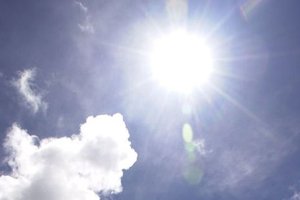Hot weather warning issued for parts of the country
Public Health England issues a heat-health warning as the Met Office forecasts high temperatures.

With hot weather arriving at the end of this week, Public Health England (PHE) has issued advice for staying safe.
Parts of the country are likely to feel very warm and there will be pockets of very high temperatures in the East of England, London, Southeast England and the Southwest.
Ishani Kar-Purkayastha, Consultant in Public Health at Public Health England, said:
Many of us welcome warmer weather, but some people may find it more difficult to cope. People recovering from COVID-19 at home, those who are self-isolating, older people and people with underlying health conditions are all more vulnerable during hot weather.
This summer, many of us are spending more time at home due to COVID-19. A lot of homes can overheat, so it’s important we continue to check on older people and those with underlying health conditions, particularly if they’re living alone and may be socially isolated.
If you need to provide care to someone at risk from hot weather, follow government guidance on how to do this safely. The most important advice is to ensure they stay hydrated, keep cool and know how to keep their homes cool.
Met Office Chief Meteorologist, Dan Suri, said:
It’s going to turn very hot for parts of England with temperatures widely reaching above 30 Celsius on Friday, Saturday and Sunday. Met Office heatwave criteria will be reached over East Anglia and southeast England.
Friday is likely to be the hottest day with temperatures of 36 to 37 Celsius in parts of east and southeast England. Temperatures could reach similar levels on Saturday.
Along with hot weather by day, it will stay warm and humid overnight with temperatures remaining in the high teens and low 20s Celsius.
To enjoy the sun while staying safe:
- drink plenty of fluids and avoid excess alcohol. Everyone is at risk of dehydration in hot temperatures, but babies, children and older people are particularly vulnerable
- stay cool indoors: open windows when the air feels cooler outside than inside; shade or cover windows exposed to direct sunlight; move to a cooler part of the house, especially for sleeping
- slow down when it’s hot: exertion heats up our bodies so plan any strenuous activities (such as exercise and gardening) outside the hottest time of the day, typically 11am to 3pm
- cool your skin with water. You could use a cool wet sponge or flannel, cool water spray, cold packs around the neck and armpits, or a cool, wet sheet
- stay connected and up to date with the weather forecast. Knowing the forecast can help you plan ahead and adapt what you’re doing
- dress appropriately for the weather – wear a hat, and light, loose cotton clothes
- protect yourself against the sun’s radiation by applying sunscreen and monitoring the real-time UV index
- eat salads and fruit – the perfect summer foods as they contain more water so can help keep you hydrated
For more information on the common signs and symptoms of heat exhaustion and heatstroke, visit NHS.UK.
Read our COVID-19 and summer temperatures blog for more advice on how to stay well in hot weather.